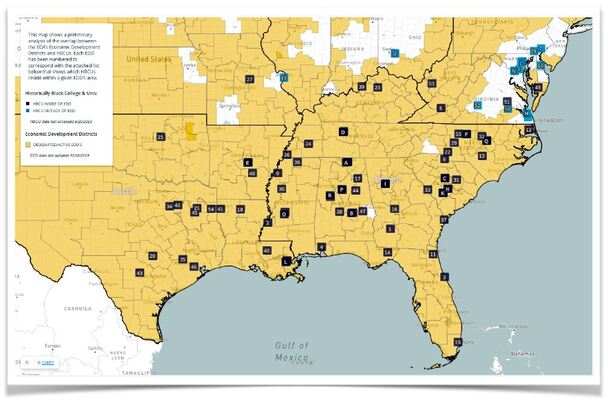 Click above to access a map & table that cross-references HBCUs with EDD service regions
Click above to access a map & table that cross-references HBCUs with EDD service regions
Historically Black Colleges and Universities (HBCUs) invest strategically in institutions and individuals at the local level to actively pursue innovation and entrepreneurship that can help more Americans improve their connectivity to and productivity within the 21st century. HBCUs have made significant contributions to the general welfare and prosperity of the United States while producing many leaders in business, government, academia, and the military. The most visible example of the U.S. Economic Development Administration's ongoing partnership with the HBCU community consists of those that have been designated as EDA University Centers.
To better encourage outreach and collaboration between Economic Development Districts (EDDs) and HBCUs, Rural Innovation Strategies, Inc. created an overlap map and accompanying contact list that easily cross-references every HBCU with the EDD that serves the region where it is located. Click here or on the image above to access the map & table.
EDA has also released updated CEDS Content Guidelines with additional information about how EDDS can engage HBCUs during the CEDS process. Click here to access the Guidelines and review pages nine through 11.
Overall, throughout the CEDS process EDD staff should ask the following questions:
Of the many contributions that HBCUs make to the communities and regions in which they operate, one of the most compelling is workforce development. HBCUs often leverage specialized degree programs and students to support local business needs – including the increasing number of companies looking to diversify their workforces. Local economies are positioned to succeed in the global economy by possessing a highly trained, technically skilled workforce, and HBCUs generate talent that regularly feeds these local ecosystems. In particular, HBCUs have implemented proven practices to assist students in STEM (i.e., science, technology, engineering and mathematics) fields to obtain significant professional experiences, research opportunities, and mentorships. It is estimated that the United States will need nearly 1 million STEM professionals in the next few years, and HBCUs are leading the charge by producing 27% of African American students with bachelor's degrees in STEM fields. In addition, 21 of the top 50 institutions for educating African American graduates who go on to receive their doctorates in science, math, and engineering, are HBCUs.
For more information about how HBCUs are preparing students for the workforce, strengthening local and regional economies, and boosting the nation's competitiveness, click here.
Updated September 2020
To better encourage outreach and collaboration between Economic Development Districts (EDDs) and HBCUs, Rural Innovation Strategies, Inc. created an overlap map and accompanying contact list that easily cross-references every HBCU with the EDD that serves the region where it is located. Click here or on the image above to access the map & table.
EDA has also released updated CEDS Content Guidelines with additional information about how EDDS can engage HBCUs during the CEDS process. Click here to access the Guidelines and review pages nine through 11.
Overall, throughout the CEDS process EDD staff should ask the following questions:
- Are there HBCUs that can assist in in the planning process with resources related to economic development decision-making, workforce development and training, entrepreneurial and innovation efforts, and research and business assistance?
- How can these institutions help in the planning process, including assisting with data and analytics?
- Are there existing relationships between these institutions and other economic development partners in the region that can be strengthened to further support regional economic development objectives?
Of the many contributions that HBCUs make to the communities and regions in which they operate, one of the most compelling is workforce development. HBCUs often leverage specialized degree programs and students to support local business needs – including the increasing number of companies looking to diversify their workforces. Local economies are positioned to succeed in the global economy by possessing a highly trained, technically skilled workforce, and HBCUs generate talent that regularly feeds these local ecosystems. In particular, HBCUs have implemented proven practices to assist students in STEM (i.e., science, technology, engineering and mathematics) fields to obtain significant professional experiences, research opportunities, and mentorships. It is estimated that the United States will need nearly 1 million STEM professionals in the next few years, and HBCUs are leading the charge by producing 27% of African American students with bachelor's degrees in STEM fields. In addition, 21 of the top 50 institutions for educating African American graduates who go on to receive their doctorates in science, math, and engineering, are HBCUs.
For more information about how HBCUs are preparing students for the workforce, strengthening local and regional economies, and boosting the nation's competitiveness, click here.
Updated September 2020